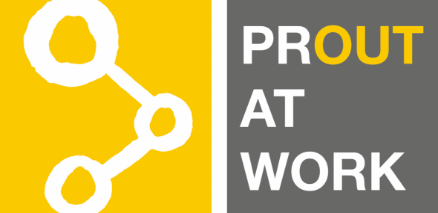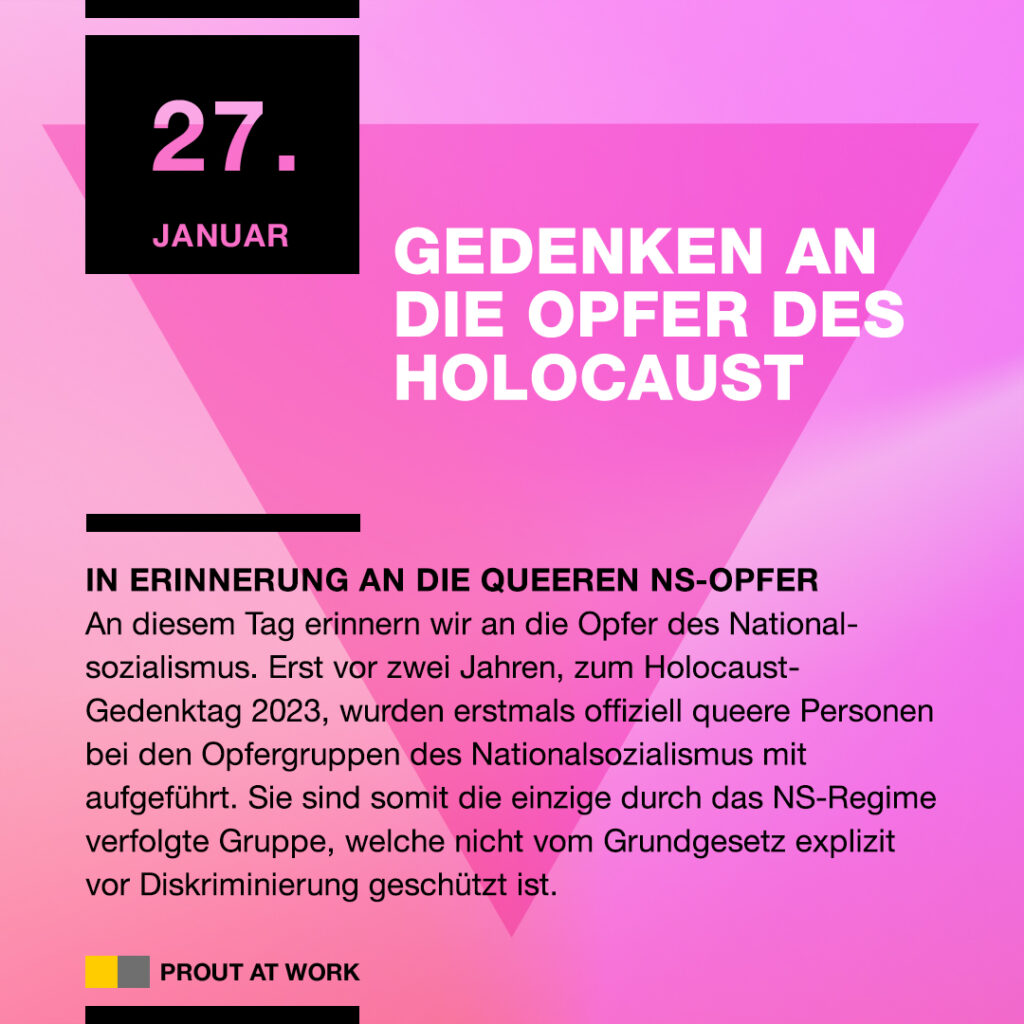
Der 27. Januar ist Welt-Holocaust-Gedenktag.
Wir gedenken an diesem Tag jährlich seit 2006 der Opfer des nationalsozialistischen Regimes. An diesem Datum erfolgte im Januar 1945 die Befreiung des Konzentrationslagers Auschwitz-Birkenau.
In der tödlichen Ideologie der Nazis gab es keinen Platz für Menschen, die sich dieser nicht widerstandslos ergaben und sich in die Einheitsgesellschaft eingliedern wollten oder konnten. Sie wurden konsequent und systematisch verfolgt, inhaftiert, in Konzentrationslager deportiert und massenhaft ermordet. Die detaillierte Organisation der Völkermorde an den europäischen Jüd_innen (die Shoah) und den Sintize und Romnja (der Porajmos) war ein bis zu dem Zeitpunkt beispielloser Zivilisationsbruch – eine Zäsur in der Geschichtsschreibung.
Zu den Verfolgten im Nationalsozialismus zählten auch queere Menschen. Genau wie andere Opfergruppen wurden sie von den Nazis inhaftiert und (in Konzentrationslagern) ermordet. In rund 100.000 Verfahren wurden während der NS-Zeit geschätzt 78.000 schwule und bisexuelle Männer ermittelt, 53.000 wurden zwischen 1933 und 1945 verurteilt und zwischen 10.000 und 15.000 wurden in Konzentrationslager deportiert. Einmal dort angekommen, überlebte nur knapp die Hälfte dieser Männer ihre Inhaftierung dort.
Lesbischen Frauen wurde keine sexuelle Selbstbestimmung zugesprochen – sie wurden hingegen als „Asoziale“ verfolgt und inhaftiert. Trans* Personen wurden angesichts ähnlich wahrgenommener Nonkonformität meist ebenfalls als unter diesen Gesichtspunkten angeklagt; aufgrund der minimalen Sichtbarkeit und mangelnder Terminologie von trans* Themen bis vor wenigen Jahrzehnten stehen dazu jedoch kaum aussagekräftige Daten zur Verfügung.
Die allgemeine Dunkelziffer, wie viele queere Personen Opfer des NS wurden, ist ähnlich hoch: Zum einen liegt die Vermutung nahe, dass auch zivile Hassgewalt eine Rolle in der Verfolgung queerer Personen spielte, zum anderen war queere Existenz auch nach der NS-Zeit ein Tabuthema.
Dieser Effekt wurde dadurch befeuert, dass auch von Seiten der Alliierten nach 1945 kein Interesse bestand, sich für die Emanzipation queerer Menschen einzusetzen. So wurde zum Beispiel der Paragraf 175, der die Verfolgung und Inhaftierung homosexueller Menschen nicht nur im Nationalsozialismus legitimierte, sondern bereits im Kaiserreich seinen Ursprung hatte, nach Kriegsende von der Bundesrepublik weiter übernommen. In der BRD und der DDR wurden Homosexuelle auf dieser Grundlage weiterhin unterdrückt, bis der Paragraf 175 im wiedervereinigten Deutschland 1994 final gestrichen wurde. Im Zuge dieser Tatsachen hinkt auch die Forschung über queere Opfer des NS sowie die damit einhergehende Berichterstattung dazu den anderen Opfergruppen weitgehend hinterher, wodurch auch 80 Jahre nach Ende des NS-Regimes vielen nicht bewusst ist, dass auch homosexuelle und trans* Menschen in Konzentrationslagern systematisch ermordet wurden. 2023 machte der Deutsche Bundestag bei der Gedenkstunde am 27. Januar zum ersten Mal offiziell auf das Leid queerer Opfer des Nationalsozialismus aufmerksam. Als Stiftung, die sich für die Chancengleichheit queerer Menschen am Arbeitsplatz und deren Rechte einsetzt, haben wir dieses Novum begrüßt, denn der Kampf um queere Rechte ist noch lange nicht abgeschlossen.
Mehr Informationen zur Situation queerer Menschen im NS.
Kritische Massen bewegen
Lassen Sie uns gemeinsam aktiv werden und queere Themen vorantreiben.

We are happy to be part of the first Rainbow Day on July 13 at the Goethe University in Frankfurt am Main.
The Rainbow Day provides all interested parties with an exceptional opportunity to enter into discussions with companies in a pleasant atmosphere, to explore their own career opportunities and to learn how a modern company offers all employees a contemporary, appreciative working environment.
The booth discussions at the exhibition stands in the auditorium center, which go beyond the company booths, offer an opportunity for exchange. Many other partners of Rainbow Day are represented: University institutions, student associations, the press – diversity is important to all of them.
The supporting program with lectures and panels goes one step further in terms of content and is also of interest to all those who do not currently wish to embark on a (new) career path.
The visitors’ lounge offers space to linger and exchange ideas, and free drinks are available here.
More information about the event is available on the Rainbow Day website (German):
Informationen für Besucher*innen – RainbowDay

Wir freuen uns beim ersten Rainbow-Day am 13. Juli an der Goethe-Universität in Frankfurt am Main dabei zu sein.
Die Karriere- und Kontaktmesse ermöglicht allen Interessierten eine außergewöhnliche Gelegenheit, in einer angenehmen Atmosphäre in Gespräche mit Unternehmen zu treten, die eigenen Karrierechancen auszuloten und zu erfahren, wie eine moderne Firma allen Mitarbeitenden ein zeitgemäßes, wertschätzendes Arbeitsumfeld bietet.
Zum Austausch bieten sich die Standgespräche an den Messeständen im Hörsaalzentrum an, die über die Unternehmensstände hinausgehen. Denn viele weitere Partner_innen des Rainbow-Day sind vertreten: Hochschulinstitutionen, studentische Vereine, die Presse – allen ist Diversität wichtig.
Das Rahmenprogramm mit Vorträgen und Panels geht inhaltlich noch einen Schritt weiter und ist auch für alle diejenigen interessant, welche aktuell keinen (neuen) Karriereweg einschlagen möchten.
In der Besucher_innenlounge bietet sich Platz zum verweilen und austauschen, kostenfreie Getränke stehen hier zur Verfügung.
RECAP
Wir durften am Donnerstag, den 4. Mai 2023, Maxi Pichlmeier als Gast bei unserem PROUT PERFORMER Lunch Talk begrüßen.
Hier gelangt Ihr zur Aufzeichnung des Gesprächs:
Über Maxi:

Wer Maxi nicht kennt: Digitale Medien sind ihm alles andere als fremd und er hat einiges zu sagen, wenn es um queeres Leben, Politik und Medien geht. Denn: Queersein ist auch 2023 politisch! Auf Maxi Pichlmeiers TikTok-Account geht es um queere News, queere Politik und die Gay Community, zu der er selbst gehört. In seinen Videos verarbeitet er eigene Erlebnisse und will News an junge (queere) Menschen bringen.
RECAP
We were pleased to welcome Maxi Pichlmeier as a guest at our PROUT PERFORMER Lunch Talk on Thursday, May 4, 2023.
Click here for the recording of the conversation (German):
about Maxi:

For those who don’t know Maxi, digital media are anything but foreign to him and he has a lot to say when it comes to queer life, politics and media. Because being queer is still political in 2023! Maxi Pichlmeier’s TikTok account is all about queer news, queer politics and the gay community, to which he himself belongs. In his videos he processes his own experiences and wants to bring news to young (queer) people.
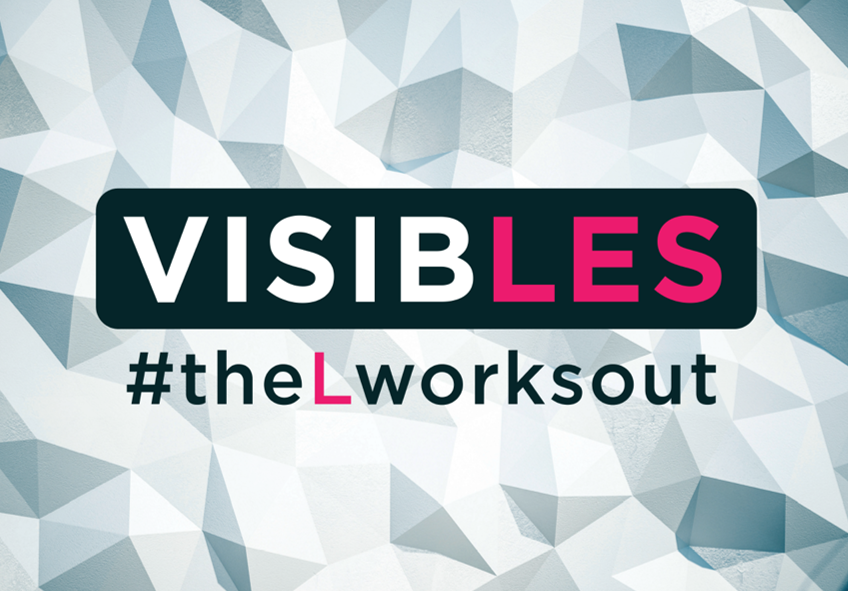
Campaign: #theLworksout for this years` Lesbian Visibility Day
Lesbian persons and Bi*sexual Women are often overlooked due to Lesbian Invisibility. To this day, there are very few visible lesbian role models-especially in a business related context. In many Networks, lesbian persons are a minority. Hence, important role models for younger colleagues aren´t guaranteed. With the Network- and Branch-encompassing campaign #theLworksout on the 26. of April, we can strenghten openly Lesbian Persons and, together with a wide spectrum of atendees, improve Visibility and point out the Diversity of Lesbian Persons.
How can i join the campaign?
- Inform yourself and speak to lesbian persons both inside your Network and outside, to raise awareness for the campaign.
- Take a portrait photo, orienting yourself on our examples, with your Tablet. It doesn´t matter if it is printed or digital. You´re welcome to use shades of grey instead of color for your portrait. (Make sure you´re allowed to use the logo of your company with your employer. If not, you may also use the company name, or hand your photo in without it.)
- Post your own campaign-photo on April 26 2023 at 10:00 AM, including the hashtags and taggings of your primary Social Media Channels.
Hashtags
#theLworksout
#LesbianVisibilityDay
#LesbianVisibility
#LesbischeSichtbarkeit
#LGBTIQBusinessLadies
#ProutAtWork
#LGBTIQRoleModels
#FlaggeFürVielfalt
Taggings
PROUT AT WORK
Facebook: @PrOut@Work
Instagram: @proutatwork
LinkedIn: @PROUT AT WORK-Foundation
Twitter: @proutatwork
If wanted, your own Company
Position your company as a supporter of the campaign and for Lesbian Visibility, and animate employees to take part.
This campaign was initiated by the PROUT AT WORK-Foundation and LGBT*IQ business-networks.
Tips for lesbian persons:
A Lesbian Coming out can still be tied to discrimination and hardships. If it helps you,
- look for Allies / Role Models in the company.
- network with the LGBT*IQ-network.
- look for support in dealing with discrimination and ill-fitting comments.
- always remember: You pick the time and place for your Coming Out.
Tips for companies:
- create sensibility for unconscious bias
- create clear expectation profiles
- anonymize applying for jobs
- Build/Strenghten internal LGBT*IQ-Networks
More information to the listed points can be found in the study “The L-Word in Business”, which deals with the situation of lesbian women in a work environment-with tips for employers.
TIps for Allies
- Inform yourself about lesbian topics.
- Use gender-inclusive language.
- Do not fetishize lesbian relationships.
- Stand up for the rights and against discrimination of Lesbian People. For example support the action nodoption, which works against the adoption of stepchildren and for the acception of Parentage in Rainbow Families.
Counseling:
Lesbenberatung Berlin
The “Lesbenberatung” is an open place for women, girls, Trans* and Inter* in different life situations.
LesMigras
LesMigraS is a branch of the “Lesbenberatung” Berlin e.V. that deals with discrimination and violence.
Letra
“LeTRa” stands for Lesben(T)Raum and is a place for meeting, counseling and event location for lesbian persons.
LIBS – Lesben Informations- und Beratungsstelle e.V.
LIBS e.V. is a psychosocial counseling office and with a goal of working against the reasons and follow up effects of discrimination against lesbian and bisexual women.
Regenbogenfamilien München
The Counseling Office in Munich works with rainbow Families to better the living conditions for them, and fight discrimination against them.
Rosa Strippe
The “Verein Rosa Strippe” is specialized on personal and individual problems of Lesbian, Gay, Bisexual, Trans* and Inter* persons, and offers help with their problems.
For a throwback and quotes to last years´ #theLworksout-campaign, take a look at our page on the Lesbian Visibility Day 2022.
Weitere hilfreiche Informationen und Interviews finden Sie auch in unserem Beitrag
zum Lesbian Visibility Day 2021.
We´re looking forward to your appliance!
More questions? Just contact us in our office!
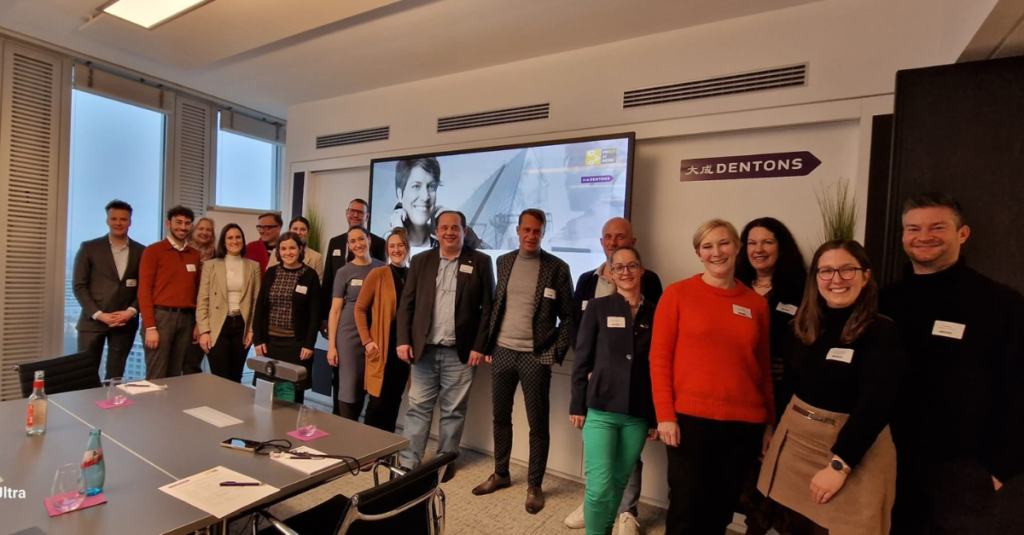
The focus of the activities and also the challenges for LGBTIQ in the work environment vary depending on the industry – therefore PROUT AT WORK, together with co-initiator Dentons, set the starting signal for a regular, industry-internal exchange: LGBTIQ in Law.
Contrary to all possible competitive situations regarding clients, the law firms were united in this case by the goal: to learn from each other, to motivate and inspire each other – for LGBT*IQ with equal opportunities in the workplace. “If we want to make a lasting change, it will only be possible if some law firms act together and put the usual diversity-washing, which is prevalent in Germany, on the back burner. The road will not be easy!” said Robert Michels, Europe People Partner and Co-Head of the European and Global Blockchain and Capital Markets Groups at Dentons.
The nearly 20 participants from numerous large law firms traveled from all over Germany and were guests of co-initiator Dentons in Frankfurt for an afternoon. In the form of a workshop, they worked together on specific framework conditions and challenges in the industry. In addition to the idea of networking, there were also a number of substantive topics on the agenda: In small groups, the participants discussed issues surrounding the special challenges of law firms with a focus on the topics of networking, out executives and allies and how these challenges can be met. Visibility, sustainability and the special decision-making process in partner-led law firms were identified as major keywords – top-down solutions from the business world may not be transferable here, but require a specific approach that takes into account the organizational structure of law firms.
Language – especially gender-sensitive language and legal language – is also a topic that D&I managers, networkers, partners and allies in law firms deal with: Are there (legal) frameworks and restrictions for the use of gender-sensitive language in contracts, official letters or communication with clients? Are there formal or informal rules on internal and/or external communication? How are these implemented?
The third large block of the agenda covered the topics of business case & measurability. Exciting discussions about different cultural and legal aspects in the USA and Europe / Germany, for example with regard to the German Data Protection Act (DSGVO), developed as well as exchanges about the use of feedback / survey results both in the concrete implementation and evaluation of measures and for internal business cases.
The will for joint initiatives, the overarching enthusiasm for the topic, and the determined networking among the participants once again showed how valuable the exchange is. The focus was primarily on the legal framework for data collection in Germany (keyword DSGVO), as well as the mutual influence of corporate culture and trust in employee surveys on the topic of diversity, as well as on areas of application of collected data. Interesting discussions unfolded on the topic of the business case including corporate culture ‘for the sake of it’.
PROUT AT WORK would like to thank all participants and co-initiator Dentons for the exciting exchange at this successful kick-off event! With the aim to build networks and to enable sustainable exchange and work on projects, LGBT*IQ in Law will take place about 3x / year.
Interested?
Your law firm wants to be part of the LGBT*IQ in Law series? Get in touch with us!
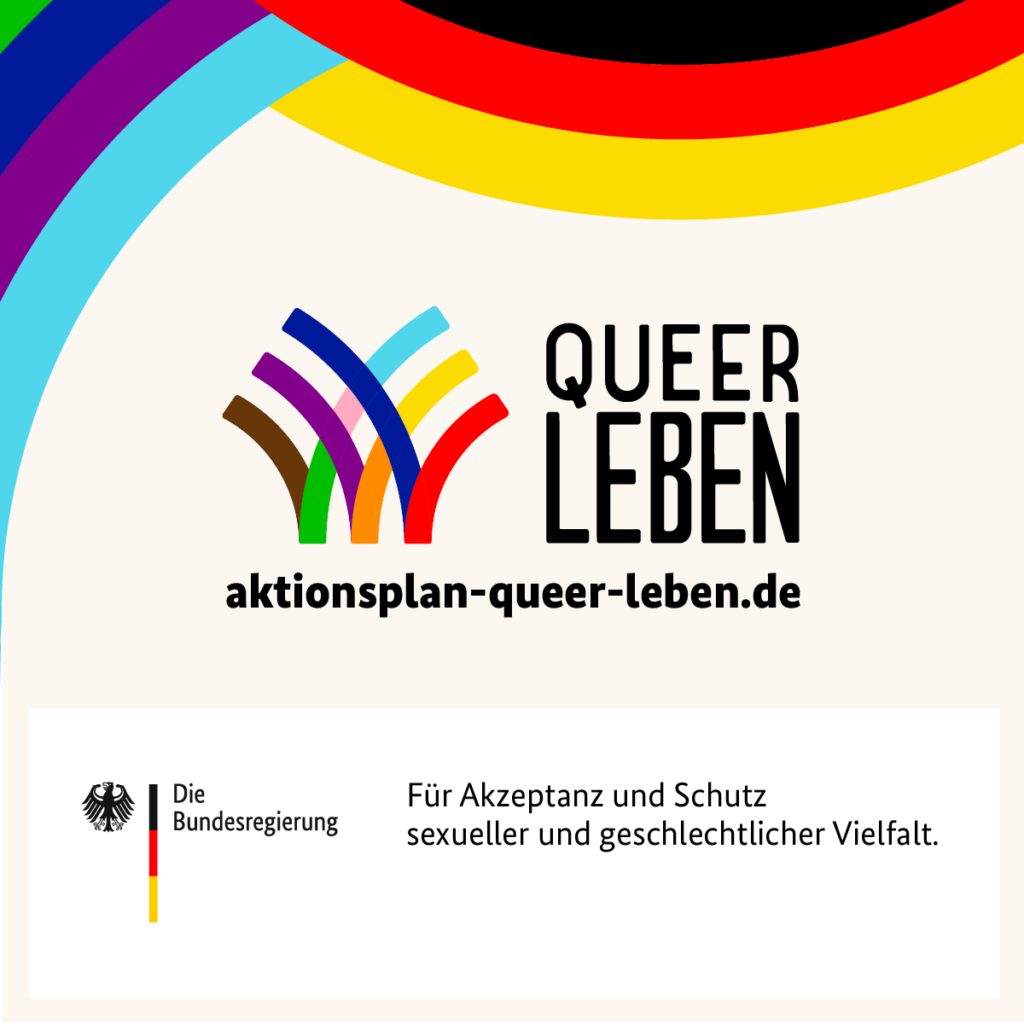
Am 18. November beschloss das Bundeskabinett den Aktionsplan „Queer Leben“, womit ein zentrales Vorhaben des Koalitionsvertrags erfüllt wurde. Festgelegt wurden verschiedene Vorhaben zur Akzeptanz sowie zum Schutz sexueller und geschlechtlicher Vielfalt. Es wurden Vorhaben für die folgenden sechs Themenbereiche festgelegt:
- Rechtliche Anerkennung
- Teilhabe
- Sicherheit
- Gesundheit
- Stärkung der Beratungs- und Communitystrukturen
- Internationales
Update 22. März 2023
Am 20. März begrüßte der Queer-Beauftragte der Bundesregierung Sven Lehmann zur Auftaktveranstaltung des Aktionsplans „Queer leben“ in Berlin. PROUT AT WORK gehört mit zahlreichen Organisationen zum Kreis derjenigen, die den Aktionsplan mit Leben füllen.
Ziel der Veranstaltung war es, die offizielle Umsetzung des Aktionsplans zu starten. Die über 200 Teilnehmenden verschiedener Verbände und Organisationen tauschten sich aus und bildeten Arbeitsgruppen, die sich wiederum in den kommenden Monaten über die konkrete Umsetzung der Vorhaben des Aktionsplans beraten.
Im Vorfeld der Veranstaltung wurden aus über 140 Bewerbungen 78 zivilgesellschaftliche Organisationen ausgewählt, um möglichst unterschiedliche Perspektiven in die Arbeitsgruppen einzubringen. Wir freuen uns sehr, dass auch PROUT AT WORK zu den ausgewählten Organisationen zählt und durch unseren Vorstand Albert Kehrer vertreten wird.
Die Auftaktveranstaltung sowie das Bilden von Arbeitsgruppen stellen erste notwendige Schritte zur Umsetzung des Aktionsplans für eine queerfreundliche Gesellschaft dar und wir freuen uns, dort in Zukunft wichtige Themen rund um LGBT*IQ am Arbeitsplatz zu platzieren.
Der Aktionsplan im Arbeitskontext
Neben Themen wie dem Selbstbestimmungsgesetz, der Reform des Abstammungsgesetz sowie der Blutspende, wurden auch unter dem Punkt “Teilhabe” weitere für den Arbeitskontext wichtige Thematiken aufgegriffen. Dazu zählen folgende Maßnahmen:
- Ausbau der Themensäule Vielfalt im Rahmen der Initiative „Neue Qualität der Arbeit (INQA)“ des Bundesministeriums für Arbeit und Soziales (BMAS);
- Forschungsprojekte zur Situation/Diskriminierung von LSBTIQ* in der Arbeitswelt sowie die Verbesserung der Förderung von Projekten für Akzeptanz;
- Erarbeitung eines Leitfadens für Arbeitgebende, der die Handlungsempfehlungen zweier Studien zum Thema „Dritte Option“ für die Verwendung im betrieblichen Alltag gut verständlich aufbereitet;
- Sensibilisierung von Arbeitgebenden, Ausbildenden, Beschäftigtenvertretungen für die Belange von LSBTIQ*-Beschäftigten und Bewerbenden;
- Unterstützung der Sensibilisierung für den Bereich LSBTIQ* in der betrieblichen Ausbildung;
- Etablierung eines Dialogprozesses (Bundesregierung, Länder, Tarifparteien, kirchliche Arbeitgebende) über die Verbesserung der Arbeitsbedingungen von LSBTIQ* in Einrichtungen von Kirchen und Religionsgemeinschaften;
- Förderung von Diversity Management im öffentlichen Dienst des Bundes;
Zusätzliche Maßnahmen im Bereich der Bundesverwaltung:
- Entwicklung einer internen Diversitätsstrategie-Bund (inkl. Schaffung von Weiterbildungsangeboten, Unterstützung des Aufbaus und der Vernetzung von Mitarbeitenden-Netzwerken und einer Strategie für diversitätssensible Personalauswahlverfahren);
- Implementierung der Vielfaltsthematik (einschl. LSBTIQ*/Geschlechtsidentität) in der Aus-, Weiter- und Fortbildung (z.B. Qualifizierungsmaßnahmen durch das Bundesministerium der Verteidigung [BMVg] in der zivilen und militärischen Ausbildung sowie durch das Auswärtige Amt in der Ausbildung im Auswärtigen Dienst);
- Regelmäßige Stärkung der Aufklärungs- und Beratungskompetenz des Sozialdienstes in der Bundeswehr zur Vielfaltsthematik;
- Durchführung systematischer Ausgangsanalysen zur Situation von LSBTIQ* (z.B. mithilfe von Beschäftigtenbefragungen);
- Sensibilisierung von Beschäftigten zu impliziten Vorurteilen und Integration in Kompetenzanforderungen/Kompetenzmodellen;
- Sensibilisierung und ggf. Schulung von Beschäftigten, die an Einstellungsprozessen beteiligt sind;
Für weitere Informationen zum Aktionsplan Queer Leben schauen Sie gerne beim Bundesministerium für Familie, Senioren, Frauen und Jugend vorbei.
PROUT AT WORK begrüßt den Aktionsplan “Queer leben”
“Neben Themen wie dem überfälligen Selbstbestimmungsgesetz, der Reform des Abstammungsgesetzes sowie einer Reform der Blutspende wurden im Aktionsplan auch weitere für den Arbeitskontext wichtige Aspekte aufgegriffen, die wir sehr begrüßen und die für unsere Arbeit wichtige Impulse setzen.”, so Albert Kehrer, Vorstand von PROUT AT WORK.

Für weitere Informationen rund um trans* am Arbeitsplatz, die dritte Option und andere arbeitsplatzrelevante LGBT*IQ-Themen, empfehlen wir Ihnen unsere kostenlosen HOW TO-Leitfäden.

On November 18, the federal cabinet decided on the action plan “Queer Leben”, as scheduled in the coalition contract. Different plans for acceptance and protection of sexual and gender diversity were hilighted, and six topic points were solidified:
- Recognition by law
- Participations
- Security
- Health
- Strenghtening of the Communities
- International issues
Update March 22, 2023
On March 20, the Queer Representative of the Federal Government Sven Lehmann welcomed to the launch event of the Aktionsplan “Queer Leben” in Berlin. PROUT AT WORK, together with numerous organizations, belongs to the circle of those who bring the action plan to life.
The aim of the event was to launch the official implementation of the action plan. The more than 200 participants from various associations and organizations exchanged ideas and formed working groups, which in turn will discuss the concrete implementation of the action plan’s projects in the coming months.
Prior to the event, 78 civil society organizations were selected from more than 140 applications in order to bring as many different perspectives as possible to the working groups. We are very pleased that PROUT AT WORK is also one of the selected organizations and will be represented by our board member Albert Kehrer.
The launch event as well as the formation of working groups represent the first necessary steps towards the implementation of the action plan for a queer-friendly society and we are looking forward to placing important topics around LGBT*IQ in the workplace there in the future.
THE AKTIONsPLAN IN THE WORK CONTEXT
In addition to topics such as the Self-Determination Act, the reform of the Parentage Act, and blood donation, other issues important to the work context were also addressed under the heading of “participation”. These include the following measures:
- Expansion of the diversity topic pillar as part of the “New Quality of Work (INQA)” initiative of the Federal Ministry of Labor and Social Affairs (BMAS);
- Research projects on the situation/discrimination of LGBT*IQ in the world of work as well as improving the promotion of projects for acceptance;
- Development of a guideline for employers that includes the recommendations for action of two studies on the “Third Option” in a comprehensible way for use in everyday work;
- Sensitization of employers, trainers, employee representatives for the concerns of LGBT*IQ employees and applicants;
- Support for raising awareness of LGBT*IQ issues in in-company training;
- Establishment of a dialogue process (federal government, states, collective bargaining parties, church employers) on improving the working conditions of LGBTIQ* in institutions of churches and religious communities;
- Promotion of diversity management in the federal public service;
Additional measures in the area of federal administration:
- Development of an internal federal diversity strategy (incl. creation of further training opportunities, support for the establishment and networking of employee networks and a strategy for diversity-sensitive personnel selection procedures);
- Implementation of diversity issues (incl. LGBT*IQ/gender identity) in initial, further and advanced training (e.g. qualification measures by the Federal Ministry of Defense [BMVg] in civilian and military training and by the Federal Foreign Office in training in the Foreign Service); Regularly strengthening the educational and advisory competence of the social service in the Bundeswehr on the diversity issue; Conducting systematic baseline analyses on the situation of LGBT*IQ (e.g., with the help of employee surveys);
- Sensitization of employees to implicit prejudices and integration in competence requirements/competence models;
- Sensitization and, if necessary, training of employees involved in recruitment processes;
For more information about the plan “Queer Leben”, feel free to drop by the Federal Ministry for Family Affairs, Senior Citizens, Women and Youth.
PROUT AT WORK Welcomes the Action plan “Queer Leben”
“In addition to topics such as the overdue Self-Determination Act, the reform of the Parentage Act, and a reform of blood donation, the action plan also addressed other aspects that are important for the work context, which we very much welcome and which provide important impetus for our work.” Albert Kehrer, CEO of PROUT AT WORK.

For more information around trans* in the workplace, the third option, and other workplace related LGBT*IQ topics, we encourage you to check out our free HOW TO guides.
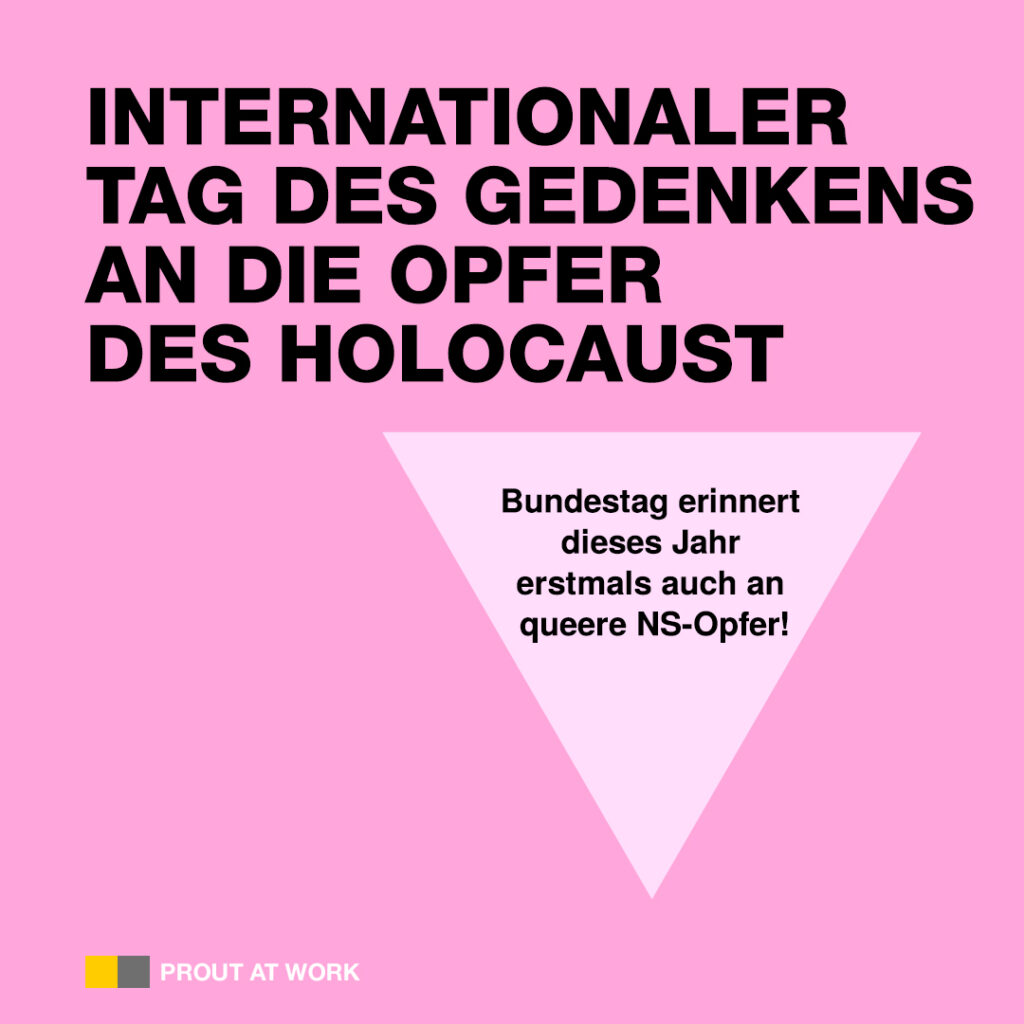
Today is World Holocaust Memorial Day!
We commemorate the victims of National Socialism and its inhuman atrocities. In the deadly ideology of the Nazis there was no place for people who did not correspond to their image of man. They were consistently persecuted, imprisoned, deported to concentration camps and murdered en masse. The organized genocide of European Jews, the Shoah, and of Sintize and Romnja, the Porajmos, was a unique breach of civilization in history. The Day of Remembrance of the Victims of the Holocaust is celebrated on January 27, the anniversary of the liberation of the Auschwitz-Birkenau concentration camp.
Among those persecuted under National Socialism were also queer people. They were also imprisoned by the Nazis and murdered in concentration camps. An estimated 78,000 gay and bisexual men were identified and 15,000 deported during the Nazi era. 53,000 were convicted between 1933 and 1945. Lesbian women were not granted sexual self-determination – they were persecuted and imprisoned as “asocials.” Trans* persons were persecuted under the same categories. The estimated number of LGBTIQ victims of the Nazi regime is high and many people do not know that homosexual and trans people were also murdered in the concentration camps.
This year, for the first time, the German Bundestag is focusing on queer victims of National Socialism during the hour of remembrance on January 27. As a foundation that advocates for LGBTIQ people in the workplace and their rights, we welcome this novelty. Especially because the struggle for rights and protections under the law for LGBTIQ people can be far from over.
For example, Paragraph 175, which legitimized the persecution and imprisonment of homosexual people in the Nazi regime, was adopted by the Federal Republic after the end of the war. In the FRG and the GDR, homosexuals continued to be persecuted on this basis for decades. Homosexuality has not been punishable in the reunified Federal Republic until 1994.
More information on the situation of queer people in the NS
Moving critical Masses
Let’s take action together to advance LGBT*IQ issues.
